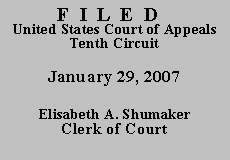

| GILMAR NILTON SERVA-LOZANO, | |
| Petitioner, | |
| v. | |
| ALBERTO R. GONZALES, Attorney General, | |
| Respondent. |
Petitioner, a Peruvian native, was granted asylum in the United States in June 1995 and subsequently granted lawful permanent residency status in February 1996. However, following his plea of guilty to battery with intent to commit a serious felony in Idaho state court in October 2004--a crime for which Petitioner received a three-year prison sentence, largely suspended--the Department of Homeland Security initiated removal proceedings. An immigration judge found Petitioner's offense constituted an "aggravated felony" under the Immigration and Nationality Act ("INA") and that he therefore was removable under INA § 237 (a)(2)(A)(iii). See 8 U.S.C. § 1227(a)(2)(A)(iii) ("Any alien who is convicted of an aggravated felony at any time after admission is deportable."). Petitioner's appeal to the Board of Immigration Appeals was dismissed,(1) and Petitioner now seeks review before this court.
Petitioner challenges both his state court conviction and the immigration judge's conclusion that his conviction constituted an aggravated felony. To the extent that Petitioner asserts that he inadvertently pleaded guilty because he was led to believe it would make prison time less likely, such claims "are beyond the scope of these proceedings." Vargas v. Dep't of Homeland Sec., 451 F.3d 1105, 1107 (10th Cir. 2006); Trench v. I.N.S., 783 F.2d 181, 183 (10th Cir. 1986) ("[P]etitioner cannot collaterally attack the legitimacy of his state criminal convictions in the deportation proceedings.").
We can, however, review Petitioner's assertion that the offense of battery with intent to commit a serious felony is not an aggravated felony. Respondent contends that this court lacks jurisdiction over this appeal under 8 U.S.C. § 1252(a)(2)(C).(2) This argument ignores the addition of subparagraph (D) by the REAL ID Act of 2005, which "overrides subparagraph (C) so that we can review 'constitutional claims or questions of law' raised in a petition for review of a removal order, even in an aggravated-felony case." Vargas, 451 F.3d at 1107 (quoting 8 U.S.C. § 1252(a)(2)(D)).(3)
Accordingly, we have jurisdiction to review this limited challenge.
The definition of "aggravated felony" under the INA includes "a crime of violence (as defined in section 16 of Title 18, but not including a purely political offense) for which the term of imprisonment [is] at least one year." 8 U.S.C. § 1101(a)(43)(F). "Crime of violence" is in turn defined as:
(a) an offense that has as an element the use, attempted use, or threatened use of physical force against the person or property of another, or
(b) any other offense that is a felony and that, by its nature, involves a substantial risk that physical force against the person or property of another may be used in the course of committing the offense.
18 U.S.C. § 16. In determining whether battery with intent to commit a serious felony is a crime of violence, we employ the "categorical approach" recommended by Taylor v. United States, 495 U.S. 575 (1990), and extended to convictions resulting from pleas in Shepard v. United States, 544 U.S. 13, 26 (2005). Under this approach, our decision is guided by "the generic elements of the offense and not [by] the particular facts of the crime." United States v. Martinez-Candejas, 347 F.3d 853, 858 (10th Cir. 2003).
Idaho Code § 18-911 defines battery with the intent to commit a serious felony as "[a]ny battery committed with the intent to commit murder, rape, the infamous crime against nature, mayhem, robbery or lewd and lascivious conduct with a minor child." Battery, in turn, is defined under Idaho Code § 18-903 as any:
(a) Willful and unlawful use of force or violence upon the person of another; or
(b) Actual, intentional and unlawful touching or striking of another person against the will of the other; or
(c) Unlawfully and intentionally causing bodily harm to an individual.
Given these definitions, it is apparent that battery with intent to commit a serious felony, punishable as a felony offense under Idaho law, qualifies as a "crime of violence" and therefore as an "aggravated felony" under the INA.
Accordingly, the decision of the immigration judge is AFFIRMED.
Entered for the Court
Monroe G. McKay
Circuit Judge
*. This order and judgment is not binding precedent, except under the doctrines of law of the case, res judicata, and collateral estoppel. It may be cited, however, for its persuasive value consistent with Fed. R. App. P. 32.1 (eff. Dec. 1, 2006) and 10th Cir. R. 32.1 (eff. Jan. 1, 2007).
1. Because the Board of Immigration Appeals affirmed without opinion, the immigration judge's decision is the final agency decision. 8 C.F.R. § 1003.1(e)(4)(ii).
2. Section 1252(a)(2)(C) states:
Notwithstanding any other provision of law . . ., and except as provided in subparagraph (D), no court shall have jurisdiction to review any final order of removal against an alien who is removable by reason of having committed a criminal offense covered in section 1182(a)(2) or 1227(a)(2)(A)(iii), (B), (C), or (D) of this title, or any offense covered by section 1227(a)(2)(A)(ii) of this title for which both predicate offenses are, without regard to their date of commission, otherwise covered by section 1227(a)(2)(A)(I) of this title.
3. Section 1252(a)(2)(D) reads:
Nothing in subparagraph (B) or (C), or in any other provision of this chapter (other than this section) which limits or eliminates judicial review, shall be construed as precluding review of constitutional claims or questions of law raised upon a petition for review filed with an appropriate court of appeals in accordance with this section.